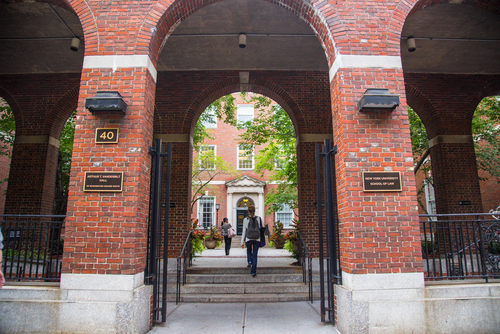Judge cites 'utter lack of specificity' as he tosses suit alleging NYU law review favors minorities

A federal judge dismissed a lawsuit Thursday alleging that the New York University School of Law illegally used racial and sexual preferences to select some members of its law review. (Photo from Shutterstock)
A federal judge dismissed a lawsuit Thursday alleging that the New York University School of Law illegally used racial and sexual preferences to select some members of its law review.
U.S. District Judge Vernon S. Broderick of the Southern District of New York said the John Doe plaintiff, a white male law student, failed to offer factual allegations supporting his argument that the law review is illegally discriminating in favor of minorities.
Law360 and Bloomberg Law have coverage.
Broderick tossed the suit for lack of standing and for failure to state a claim. He said the claim failed under Title VI of the Civil Rights Act of 1964, which bars discrimination in programs receiving federal financial assistance; under Title IX of the Education Amendments of 1972, which bans discrimination in federally funded education programs; and under Section 1983 of the Civil Rights Act of 1871, which allows suits for civil rights violations.
Doe’s allegations, Broderick said, are based on “considerable speculation” and an “utter lack of specificity.”
Doe had cited Students for Fair Admissions v. President and Fellows of Harvard College, a 2023 U.S. Supreme Court decision that struck down race-conscious admissions programs at universities.
Before the Supreme Court decision, the law review set aside 12 out of 50 law review spots for students chosen by a diversity committee. Among the factors considered were the applicant’s “race, ethnicity, gender, sexual orientation, national origin, religion, socioeconomic background, ideological viewpoint, disability and age.”
After the decision, the law review website no longer mentioned a diversity committee or a “diversity set-aside.” Instead, the publication invited students to submit a statement providing a more comprehensive view of themselves as individuals for the selection process.
According to Doe, the law review uses the statements “to give preferential treatment to women, non-Asian racial minorities, homosexuals and transgender people when selecting its members.”
But the alleged discrimination hasn’t yet happened, Broderick said. Doe hasn’t been denied a spot on the law review. And “considerable speculation undergirds” his belief that students will share information about their minority status in their applications, and that law review editors will select applicants based on those characteristics.
“Doe never explains the basis for his belief that the facially lawful selection policy is masking an otherwise unlawful selection process,” Broderick said. “Such an utter lack of specificity is insufficient to confer Doe with standing to bring this suit.”
Even if Doe had standing, he did not state a claim for relief because his allegations “are conclusory and undermined by the plain text of the facially neutral policy,” Broderick wrote.
In addition, Broderick said, the suit does not identify intentional discrimination by New York University in the operation of the law review, which is overseen by students.
“Doe does not allege that NYU plays any role in the day-to-day operations of the law review or the selection of its new members, let alone its actual knowledge of any covert plans by unidentified editors to give preferential treatment to select students in violation of federal law,” Broderick said.
Broderick said he was dismissing the suit without prejudice to allow Doe to bring a new suit if his claims should ever ripen.
Doe was represented by America First Legal, a group founded by Stephen Miller, a former Trump administration senior adviser.
See also:
NYU School of Law illegally disfavors white men in law review selection, suit alleges
Write a letter to the editor, share a story tip or update, or report an error.



